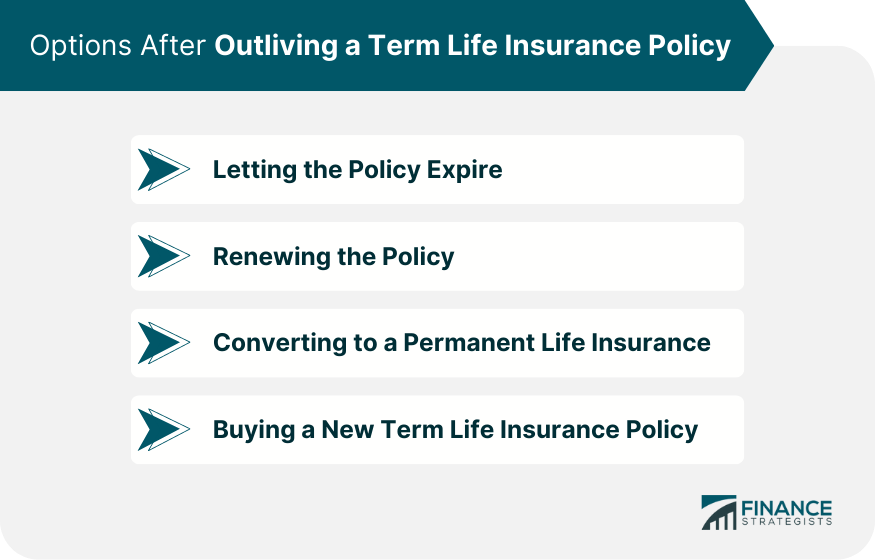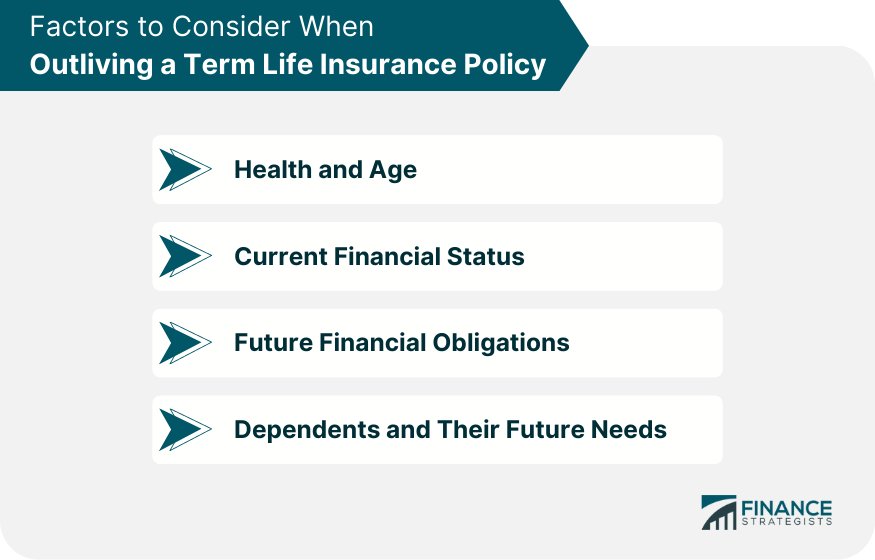Term life insurance is a form of life insurance that provides coverage at a fixed rate of payments for a limited period, the relevant term. Once the term expires, it's up to the policyholder to decide whether to renew the policy or let it lapse. While term life insurance policies come with no investment or cash value component, they are favored for their simplicity, lower premiums, and substantial death benefits. Outliving a term life insurance policy means that you are still alive at the end of the policy's term. When this occurs, the coverage ends, and you are no longer required to pay premiums. However, this also means that your beneficiaries will receive no death benefit from this policy. Many term life insurance policies offer the option to renew or convert the policy into a permanent one, but these come with their own set of considerations. If you have no dependents or financial obligations that require a life insurance payout, you might consider letting your term life policy lapse. It means that you stop paying the premiums, and your coverage ends. However, letting the policy lapse without having an alternative insurance or financial plan could leave your dependents vulnerable to financial risk if an unexpected event occurs. Many insurers offer the option to renew your term life insurance policy after it expires, albeit often at a higher premium. The increase in premium is primarily because insurance rates are directly related to age and potential health risks. As you age, the likelihood of health issues increases, and so does the risk to the insurer. Hence, while renewal is an option, it's critical to factor in the higher costs. Another option is to convert your term life insurance policy into a permanent one, such as whole life or universal life insurance. These types of policies offer coverage for your entire lifespan and often come with a cash value component. However, they are generally more expensive than term life policies. If you're considering this option, it's essential to weigh the costs and benefits, as well as your long-term financial objectives. If your health is in good shape, you might consider buying a new term life insurance policy. While your premiums will likely be higher due to your increased age, this could be a cost-effective way to continue your life insurance coverage. It's always best to consult with a financial advisor or an insurance expert to explore this option and understand the implications. Your health and age significantly influence the cost of life insurance. Older age and health conditions usually lead to higher premiums. Therefore, it's vital to consider your current health and age when deciding what to do after outliving your term life insurance policy. Your current financial status, including your income, savings, and financial responsibilities, should play a crucial role in your decision. If you're financially stable with a sufficient emergency fund and retirement savings, you might need less life insurance coverage. Think about any financial obligations that could arise in the future. For example, if you plan to support a child's college education or have a significant mortgage on your home, you may need continued life insurance coverage to protect against these potential financial burdens. Consider the needs of your dependents. If your children are grown and financially independent, your spouse is comfortably retired, or you have adequate savings, you might require less or no life insurance. On the other hand, if your loved ones depend on your income for their daily expenses, continuing life insurance might be essential. Navigating the life insurance landscape can be challenging. Working with a financial advisor or a qualified insurance professional can help you understand your options and make an informed decision. As life changes, so do your insurance needs. Regular reviews of your life insurance policy and overall financial plan can help ensure that you have the right amount of coverage. Plan ahead for the end of your term life insurance. Knowing your options and having a plan can make the transition smoother and more financially sound. Navigating the crossroads of outliving a term life insurance policy requires strategic planning and decision-making. This policy, which provides coverage for a fixed period, leaves you with a variety of options upon expiry. You may let it lapse, renew it, convert it to a permanent policy, or procure a new term life insurance. Your age, health status, current and future financial obligations, and the needs of your dependents greatly influence this choice. Consulting a professional, conducting regular insurance reviews, and preparing for your policy's end are crucial steps to align your decisions with your financial objectives. Ultimately, the goal is to secure an approach that best ensures financial stability and protection for you and your dependents, adjusted to your unique circumstances and needs.Overview of Term Life Insurance
What Happens if You Outlive Your Term Life Insurance Policy?
Options After Outliving a Term Life Insurance Policy
Letting the Policy Expire
Renewing the Policy
Converting to a Permanent Life Insurance
Buying a New Term Life Insurance Policy

Factors to Consider When Outliving a Term Life Insurance Policy
Health and Age
Current Financial Status
Future Financial Obligations
Dependents and Their Future Needs

Practical Advice for Those Who Outlive Their Term Life Insurance
Professional Consultation
Periodic Review of Life Insurance Needs
Preparation for the End of Term Life Insurance
Bottom Line
What Happens if You Outlive Your Term Life Insurance Policy? FAQs
If you outlive your term life insurance and decide to let the policy expire, you simply stop paying premiums, and your coverage ends. This means that your beneficiaries will receive no death benefit from this policy. It's a suitable option if you have no dependents or financial obligations needing coverage.
If you outlive your term life insurance and still want life insurance coverage, you generally have three options: renewing your term life insurance policy, converting your policy into a permanent life insurance policy like whole or universal life, or buying a new term life insurance policy. Each of these options has different implications and costs that you should carefully consider.
If you outlive your term life insurance and opt to renew it, you can continue your coverage, usually at a higher premium. This is because the risk to the insurer increases as you age, leading to an increase in premium rates.
If you outlive your term life insurance and choose to convert it to a permanent life insurance policy, you can enjoy lifelong coverage with an added cash value component. However, the premiums for permanent life insurance are typically higher than those for term life insurance.
If you outlive your term life insurance, factors to consider include your current health and age, current financial status, future financial obligations, and the needs of your dependents. Your decision should be based on these considerations to ensure that it aligns with your financial goals.
True Tamplin is a published author, public speaker, CEO of UpDigital, and founder of Finance Strategists.
True is a Certified Educator in Personal Finance (CEPF®), author of The Handy Financial Ratios Guide, a member of the Society for Advancing Business Editing and Writing, contributes to his financial education site, Finance Strategists, and has spoken to various financial communities such as the CFA Institute, as well as university students like his Alma mater, Biola University, where he received a bachelor of science in business and data analytics.
To learn more about True, visit his personal website or view his author profiles on Amazon, Nasdaq and Forbes.











